Medoro was born in Sgurgola (province of
Frosinone, Italy) on January 10th, 1892, in his
parents' house in via del Calvario, being third of
seven sons
of Camillo
Pallone,
a 34-years-old blacksmith from a family native of Morolo (also
in the province of Frosinone) and of Lorenza Posta, a 25-years-old housewife, daughter
of the notary Raffaele and of Maria Perfetti. Lorenza lost her
father when she was six years old, and her mother when she was
eight, so she grew up under the wardship of her uncle don Domenico
Posta, who belonged to a noble family of Sgurgola, the counts
Posta della Posta.
Camillo was a socialist, he used to wear a necktie à la
Lavalliére, his father Francesco died in jail because he
had given a policeman a punch. Camillo was a blacksmith, as his
father and his brothers Antonio were; he also had a sister, Candida,
who lived with her husband in another village of Ciociaria (the
region of Frosinone).
Lorenza and Camillo's children were: Maria (1888), Ennio (1889), Medoro (1892), Guido (1893), Quirino
(1894), Alberto (1897) (see
my
web page
about him)
and Gustavo (1899). All the
sons trained in their father's shop, where they learned the rudiments
of the trade, but only Guido became a blacksmith like his father.
All the sons had studied music and played in the village band;
Medoro played the clarinet.
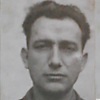
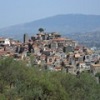


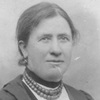
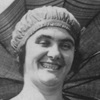
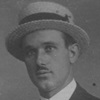
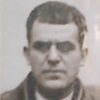

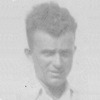
Childhood
and adolescence
The name Medoro exists only in Italian and is anyway rather unusual
even in Italy: it is the name of a character in Orlando Furioso
by Ludovico Ariosto, later taken up in other literary works and
in figurative art.
Medoro Pallone attended primary schools in Sgurgola, his teacher
was a very cultivated and vigorous priest, who stimulated his
intelligence and gave him a very advanced school preparation,
almost at a secondary school level.
The priest tried to convince Medoro to enter the Seminary, to
pursue his studies, since he was intelligent and bright; he tried
to convince Medoro's father, explaining that at the end of the
studies the young man would not be forced to become a priest,
but Camillo didn't agree, luckily for all the descendants.
At the age of 16 years (in 1908) Medoro went to Rome
to prepare himself to become an engine-driver, having his apprenticeship
at "Officine Tabanelli" workshop in via Prenestina and
attending night school.
In Rome he dwelt by his uncle Gerolamo Posta (nicknamed "Mommo"),
brother of his mother Lorenza and, besides preparing his "masterpiece",
a piece or a tool to be made to clear the competition for engine-drivers,
he read books and went to the Opera. His elder brother Ennio also lived in
Rome and became an engine-driver but, being anarchist, was banned
from the railways and had to earn a living as a taxi driver. Another
brother, Quirino, was hired as an engine-driver, but being politically
suspect, he was continually transferred for work to several provinces
of Italy.
Military
service and war
Medoro could not become an engine-driver because in 1912, at the
age of twenty, he was forced to leave to serve in the army. He
was assigned to the grenadiers, but the farewell party before
leaving made him reach his detachment one day late, and as a punishment
he was sent to the 1st Heavy
Artillery
regiment, in Alessandria and then in Casale Monferrato (province of
Alessandria, Piedmont), and this probably saved his life, since
in the imminent Great War the grenadiers underwent much more losses
than artillerymen. In the following years Medoro recalled the
big chill as he was on guard in Casale Monferrato.







As Medoro
was on the point to complete the three years of conscription,
the Great War broke out and he was sent to the front, that he reached
holding the rank of sergeant.
Medoro fought on Asiago plateau (amongst other places in Luserna),
by Piave river, on Montello hills, in Vittorio Veneto, he took
part in the seizure of Gorizia and in Caporetto defeat: he used
to describe this battle as a betrayal of the Generals.
We can read on his matriculation sheet that he had a
mention in dispatches saying: "He showed a commendable
valour in digging up, together with other soldiers, and under
intense fire of the enemy artillery, three of his comrades who
had been swept away by the ruins produced by the burst of a 240
grenade - Gorizia 1917 May 17th - Ord. Berm. N°249 - Granted
with Cross for war merit, by determination of the 13th Army Corps,
the 1918 July 2nd". On 30th October, 1918 he was decorated with the
War
Merit Cross.
During the war a very sensitive mare was assigned to him, and
saved his life many times: once they had to cross a river, but
the mare refused to go ahead and, shortly after, the place where
they had to cross was hitted by a great number of bombs.
Postwar
period and antifascism
After the war, demobilized with the rank of warrant-officier,
he came back to Sgurgola disheartened and traumatized, resolved
to see no more wars; the fascist movement started to show itself,
and Medoro at the beginning watched it with curiosity, then he
realized the bullying the fascists made against workers and opposers,
and begun to associate with Sgurgolan anti-fascists who lived
in Rome (amongst the others the Pompi brothers), and so he became
an anti-fascist.





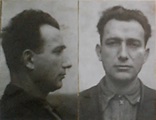
The difficult
conditions after the First World War and the example of the Soviet
Revolution of 1917 created a political movement of revolt, led
by communists, socialists and anarchists, which carried out occupations
of factories and lands, particularly those of large landowners
, including the Catholic Church.
The English historian Eric J. Hobsbawm wrote about the land occupation
movement in 1919: «Thus the movement in Latium, which
set off a nationwide wave of land invasion in 1919, claimed to
"defend the land to which they asserted legal rights
against the usurpers"».
The Vatican newspaper, L'Osservatore Romano, quoted by Del Carria,
wrote: «At dawn, ... improvised caravans of peasants,
to the sound of music and with banners, marched upon the latifundia
of the region and decreed their occupation, indicating the boundaries
of the areas they occupied with special marks".
In 1920 the socialists conquered 30 municipal administrations
in the province of Frosinone, including Sgurgola, and in 1923
the section of the PSI of Sgurgola passed en bloc to the Communist
Party of Italy. In the same year Medoro was appointed correspondent from Sgurgola
of the Roman newspaper "Il Mondo" founded by Giovanni
Amendola and shut down by the fascists in 1926. A 1927 report
by the Prefecture of Frosinone shows that "at the time of
the murder of Matteotti (1924) he wrote some articles on the newspaper
"Il Paese". On April 6, 1924, the Communist Party of
Italy reached 20% in the elections.
He opened a grocery store on the main street of Sgurgola, and,
on January 29, 1925, he married Adele, also known as Adelina,
the nineteen-old daughter of small landowners of the village.
The pair went and dwell in a house owned by the Pallone grandparents
on Muraglione square (named "piazza dell'Arringo").
Medoro restructured the house adding it a floor. The pair gave
birth to four daughters: Maria Gabriella, Vezia, Ena and, several
years later, Maria Raffaella.
For his participation in Communist movement Medoro was "reduced
from the rank of warrant-officier for his public manifestations
of subversive opinions, propaganda or intrigues and direct or
indirect participation to association or manifestations hostile
to the fundamental institutions of the state, by Royal Decree
of 1925 November 27th" as can be read on his matriculation
sheet.
Medoro made his anti-fascist choice evident when he didn't go
to vote the 1929 "plebiscite", elections with just one
register, refusing also to leave the voting-paper blank. He always
tried to avoid any clash with the fascists, but one day a fascist
procession passed on the main road, and overtook him in front
of his grocery with his hat on; when a fascist enjoined him: "take
off your hat", Medoro stood with folded arms and his hat
on; the fascist didn't dare to attack him.
Breeding
activity
Soon he was forced to close the store because, being anti-fascist,
he was overloaded with taxes; moreover he couldn't do other jobs
because he wasn't a member of the fascist party; then he started
to dedicate himself to rational bee-keeping, bringing himself up to date
with the newest books on the topics and purchasing the best and
and most modern equipments (for instance he ordered from a firm
of Turin the Dadant-Blatt beehives).
His activity was seen with skepticism by the villagers, who practised
a primitive bee-keeping, based on the destruction of the beehives
at every honey-extraction and who thought it was impossible to
make money with "wasp shit".









Medoro's
beehives were placed both in Sacco river valley, at Villa
Magna,
near the ruins of a Roman imperial villa, both in other villages
of the region, for instance at Anagni, near the railway station,
and at Isola Liri. He also raised queen bees in the garden of
his parents' house, in via del Calvario at Sgurgola, where he
planted officinal herbs and fruitful trees besides a path, to
supply the bees pollen.
He bought a car and, associated with his cousin Elia, he travelled
around the region to examine his beehives (to check the condition
of the apiaries, supply rescue feeding and to extract honey).
He sold honey to the firms Tassi and Ambrosia. In the best years
he produced up to 3000 kgs of honey, having good profits, which
the fascists attributed to the "Russian gold".
Medoro also bred chicken and laying hens in his land named Capuani,
below via del Calvario, always with rational breeding methods,
and modern equipments, like the incubator; on the same land he
also bred pigs, of Perugina breed, whose meat was then processed
by Adele to make salamis and sausages.
The persecution
and the confinement
For his anti-fascists activities and ideas Medoro was periodically
arrested with some pretext on the occasion of public solemnities
or when the king or Mussolini passed in the outskirts; he was
usually secluded in a detention room in Sgurgola or Anagni, Frosinone,
Piglio and Acuto, together with common prisoners, in awful hygienic
conditions, and amongst parasites.
For example, on the occasion of the wedding on January 8th, 1930 between Prince Umberto
of Savoy (the King-to-be Umberto II) and Princess Marie José
of Belgium, Medoro "being included in the list of people
dangerous in political line to be arrested in certain circumstances"
(see the 1932
version
of the list) was arrested on December 28th, 1929 for measures "on the occasion
of August Wedding" and released on January 11th, 1930.
He was usually released after two or three days, but he had to
be on the alert; he was often secluded also in Rome's jail, Regina
Coeli, where many Communist prisoners gave lessons of politics
and Communist teaching, and where Medoro knew many Communist Party
leaders. In Rome's jail the detention conditions for him were
some better than in country jails, the political prisoners gathered
together and the jailers respected them, even if however Medoro
did not appreciate them.
The political activity of Medoro was centered on the attempt to
reconstitute the Communist Party, for this goal he met many persons;
one day one of them, a man from Sgurgola who lived in Rome, betrayed
him and accused him, besides of subversive activities, even of
planning a dynamite attack to BPD (Bombrini Parodi Delfino) bomb
factory at Colleferro (province of Rome); the delation drove thirty
persons of Sgurgola in jail.
Medoro was tried by a special court, and during the trial the
informer retracted the accusation, so the fascists punished him
and beat the soles of his feet with small sacks filled with sand,
so they didn't leave any mark on him.
In spite of the spy's retractation, Medoro on February 19th, 1938 was anyway sentenced to one year of
confinement at San Nicola, an island of Tremiti archipelago, off
the Apulia coast, where he found many other confined anti-fascists;
as he disembarked they already knew everything about him and,
knowing his skills, they made him director of mess.
In San Nicola the internees slept in a dormitory, drunk water
unloaded from a tanker, and had a small daily allowance (named
"mazzetta") to buy food and cigarettes; on the island
it was impossible to find vegetables and the quality of the meat
which was available was very low, therefore Medoro, in order to
vary the meals and to save money, started to buy fish from the
islander fishermen, mainly dentexes, which passed by the shore
in very thick shoals.
Medoro and his brother Guido (they were always arrested together)
were allowed to come back home from the confinement for few days,
because their father Camillo had an ictus.
As they arrived in Sgurgola, looking very slim and darkened by
the sun, they were led by the police through the village, with
a suite of kids, happy for the novelty. The two brothers had to
sleep together by the Medoro parents-in-law, the Corsi family,
and an escort of two policemen slept in the next room. By day
they could go by their parents, in via del Calvario, always followed
by the policemen, and they could meet their relatives.
Medoro's parents-in-law, Giuseppe and Domenica Corsi (even bearing
the same surname they weren't relatives: the family name "Corsi"
is still very common in Sgurgola) although not being openly antifascist,
didn't like to withstand fascist abuses: when they tried to compel
Giuseppe to consign "to the homeland" the iron
railing
in front of their house (on the present via Amendola) in order
to reuse its iron for war purposes, the man replied with a vehement
refusal.
Medoro's parents lived in via del Calvario until their death.
Camillo died in 1941, and until the age of eighty (more or less
the same period in which his sons were confined) he worked in
his smithery, in front of his house (today the number 19 of via
del Calvario), but then Medoro convinced him to stop (Medoro used
to called his father "tata", using an old-fashioned
way, previous to the adoption of the term "papà").
At the end of the leave Medoro and Guido went back to the Tremiti,
and then, at the end of the term, back to Sgurgola. After his
coming back Medoro was kept under police surveillance, and so
he couldn't meet more than two persons, but the most part of the
people of Sgurgola avoided even to say him hullo, even if then
they sent him somebody to apologize for this, justifying themselves
with the fear of reprisals for themselves and their children.
Even his letters were opened and read and, when he wrote his brother
Gustavo in the USA, he used he used a coded language, avoiding
to quote the real names of the persons, but defining them as "the
son of …", followed by the nickname (in dialect) of
his father or his mother.
Medoro underwent continuous perquisitions of the police in his
house, who could not recognize the subversive books he owned,
and instead sequestrated innocuous books or directly critical
towards Communism, as a book on Soviet jails.
The policemen, on the occasion of controls and perquisitions,
usually had a polite behaviour. In spite of this, one day the
warrant-officier of Sgurgola police station interrogated Medoro,
and receiving sarcastic replies, in his report defined Medoro's
manners as "cynical and repulsive", that reminded greatly
the "haughty and arrogant manners", the terms that a
prefect used to define Sandro Pertini's behaviour before the fascist
special court for the defence of the State.
One day his daughter Vezia, being a child, was caressed by a policeman,
and reacted saying him: "you, with your filthy hat, you
imprisoned my father" (the policeman wore the classic
three-cornered hat).
World
War II
On 1940 June 10th Italy came into
war beside nazi Germany, and against United Kingdom and France;
Medoro understood this was the end of Mussolini, since attacking
United Kingdom sooner or later will have involved United States,
with their huge military strength.
During the Second World War Medoro stood in Sgurgola and wasn't
arrested anymore, even if he ran a big risk when a fascist of
Sgurgola went at the Wermacht officier who commanded the antiaircraft
battery installed by the railway station and gave him the list
of the anti-fascists of Sgurgola, where the name of Medoro was
at the first place, but the officier tore up the list in his face.
One day he went to Rome with his daughter Gabriella to buy her
a watch as a present for clearing the final examination of the
lycée; that night they went for dinner in a restaurant
in via dello Scalo di San Lorenzo, with some Communist comrades,
like Aurelio Caratelli (once exiled in France) and Guido Pompi.
After one or two days, 1943 July 18th, that quarter was destroyed
by the well known bombing of San Lorenzo. In the quarter there
were the railwaymen's houses, and between them there were many
people from Sgurgola.
Sgurgola wasn't directly involved in any bombing, but its inhabitants
saw and heard the cannon-shots of the artillery pass over their
heads, they saw the allied bombers pass, and saw the fighters
shot down (and took part in saving the allied pilots from the
Germans).
Moreover the Germans made repeated combing out operations to capture
every man fit for the job to be sent and dig trenches at Cassino,
but Medoro and his relatives (his brothers Alberto and Ennio and
the latter's sons, Spartaco and Camillo) always succeeded to escape,
running away on the fields below the village and then climbing
the mountain, after passing below San Giovanni church.
One day the Germans came in the house to comb out and found only
Gabriella, who drove them in any room of the house; the soldiers
found the bed unmade and asked where the men were, and as she
answered they were in the fields to work, the chief commented:
"Italians nichts working! Only women working".
Medoro in the meanwhile observed with anxiety the scene from the
mountain.
The Sgurgola people hid many allied soldiers, including some shot
down pilots, from the United States, United Kingdom, South Africa,
France and even two Russians, welcomed for lunch at Medoro Pallone's
home, with serious communication difficulties. The soldiers were
hosted in the countryside or in the mountains, for example by
shepherds. A Frenchman was hosted by a pastor who was a former
schoolmate of Gabriella, who was able to speak to us in French.
The latter as he saw the sheperd's cioce, (typical leather shoes)
called them "pantoufles".
The antifascist
Resistenza
Eventually, on 2 June, 1944, Sgurgola was freed by the Moroccan
and French troops that had entered the town coming from Morolo;
in the village nobody knew the rapes and other violent act made
by the Moroccans in the southern Ciociaria, and the rough manners
used by the French officiers to deal with them were judged as
manifestations of the worst colonialism.
The second
post-war
Anyway the liberating troops destroyed Medoro's beehives, so that
he was left without means of maintenance, and just after many
years he could get a trifling sum as a compensation of war damages,
even if he had tried in any manner to assert his own rights.
Having lost the only source of earnings, the family got along
as they could, for instance baking bread to be sold by retail,
and Adele also worked come as a cook. His daughter Ena was forced
to abandon the university studies at the Architecture faculty,
while Gabriella could get a Social worker diploma only thanks
to a scholarship.
At the end of the war many anti-fascists of Sgurgola planned to
be revenged against the fascists for the persecutions underwent
during the fascist dictature, but Medoro succeeded to rein them
in, arguing: "we are not like them" and anyway remarking
that noone of the anti-fascists had been killed.
On 13 September, 1944 the federal committee of the Italian Communist
Party was formed with a secretary and 10 members, including Medoro.
In October 1944 in Boville Ernica Medoro spoke to hundreds of
peasants illustrating the “Gullo decrees”, which established
the concession of uncultivated or badly cultivated lands to peasants.
The rally ended with a meeting, in the presence of over five hundred
members, during which a new steering committee was appointed.
On 3 December, 1944 at the provincial administration headquarters
in Frosinone the first organization conference of the Italian
Communist Party federation of the province was held. 62 delegates
from 25 sections were present and Medoro sat in the presidency
together with Enrico Berlinguer. Medoro gave a report as a member
of the federal council and in charge of the work among the peasants
in support of the struggles for the occupation of the lands in
Sgurgola.
Medoro was elected provincial deputy, the province seat was provisionally
Fiuggi, since Frosinone was destroyed. Moreover he engaged himself
in the peasants unions, like Federterra, and Alleanza
Contadina and, as an acknowledgment for his engagement, a reclamation
canal in Isola Liri was named after him.
He was also active in the Frosinone Communist Party Federation.
Medoro was an impassioned and effective public speaker, and was
also active in making political meetings in the province. The
Communist Party leaders decided to stand him as a candidate for
the Chamber of deputies, but after communicating him this statement,
they changed their mind and the candidature faded away. Medoro
remained until his deat ha member of the Communist Party and of ANPPIA (Italian National
Association of Antifascist Victims of Political Persecution).
Being atheist Medoro did not made christen his daughters and,
as they grew up, they made it secretly, of their own initiative
or under pressure and attendance of relatives. The family didn't
use to celebrate any religious solemnity, and they laughed at
the strange habits of the village's bigots.
When the war ended, since Camillo died in 1941, the Pallone brothers
distributed their father's estates, and the house at Muraglione
was allotted Gustavo, the brother emigrated in America, who demanded
it at any cost and, as he got it, he sold it to a Sgurgola woman
emigrated in the United States, who wanted to come back home.
Being left homeless, Medoro was forced to adapt his father's smithery,
where he lived until his death.
His father Camillo used to smoke just one or two cigars a day,
but Medoro was a heavy smoker of filterless cigarettes; one day,
by a badly extinguished butt, he set fire on a straw hut built
in the land that his wife had inherited in La Cesa, near the neighbouring
village of Morolo.







The death
Smoking provoked Medoro a lung tumor; on 1966 October 13th, at
the age of 74, he was suddenly taken ill, his daughter Gabriella
rushed from Rome and took care of calling an ambulance to hospitalize
him in Rome, since the village's doctor wasn't there.
During the ambulance trip, with no doctor on board, Medoro had
a respiratory crisis, so the ambulance tried to reach at least
Colleferro
hospital,
which was closer, but Medoro got there lifeless. Two days later
Medoro was buried in Sgurgola cemetary (see the news on l'Unità). The Communist
Party cell of Sgurgola, then renamed basic unit of the Left Democrats
and currently Democratic Party's Circle, were named
after him.
On April 25th, 2014 in Sgurgola,
organized by the Democratic Party's Circle, as part of the celebrations
for the 70th anniversary of
the liberation of the province of Frosinone from Nazi-fascism,
Medoro Pallone was remembered in Piazza dell'Arringo, in front
of the Circle and under the windows of the house where he lived
for most of his life. His daughter Gabriella remembered
Medoro,
recounting some episodes of his life.
BIBLIOGRAPHY:
BONGIORNO Pino (2008) Una vita da comunista. Biografia di Antonino
Bongiorno. L'Albatros, Rome.
DEL CARRIA Renzo (2020) Proletari senza rivoluzione. Vol. 3. PGreco,
Rome. p. 88-89.
FEDERICO Maurizio (1985) Il biennio rosso in Ciociaria, 1919-1920
: il movimento operaio e contadino dei circondari di Frosinone
e Sora tra dopoguerra e fascismo. E.D.A., Frosinone.
GIAMMARIA Gioacchino (1976) Dati sulla Resistenza in Ciociaria.
Quaderni della Resistenza Laziale, Regione Lazio, n. 8,
Rome
GIAMMARIA Gioacchino, GULIA Luigi, IADECOLA Costantino (a cura
di) (1985) Guerra, liberazione, dopoguerra in Ciociaria: 1943-45.:
Amministrazione provinciale Frosinone, La Tipografica, Frosinone.
HOBSBAWM Eric John (1999) Uncommon people : resistance, rebellion
and jazz. Abacus, London. p.234.
MAZZOCCHI Ermisio (2003) Lotte politiche e sociali nel Lazio meridionale:
storia della Federazione del PCI di Frosinone, 1921-1963. Carocci,
Rome.
SALVATORI Roberto (2013) Guerra e resistenza a sud di Roma: Monti
Prenestini e Alta Valle del Sacco 8 settembre 1943-5 giugno 1944.
Pubbliesse, Olevano Romano.
 page
last updated: August
13th, 2024
page
last updated: August
13th, 2024